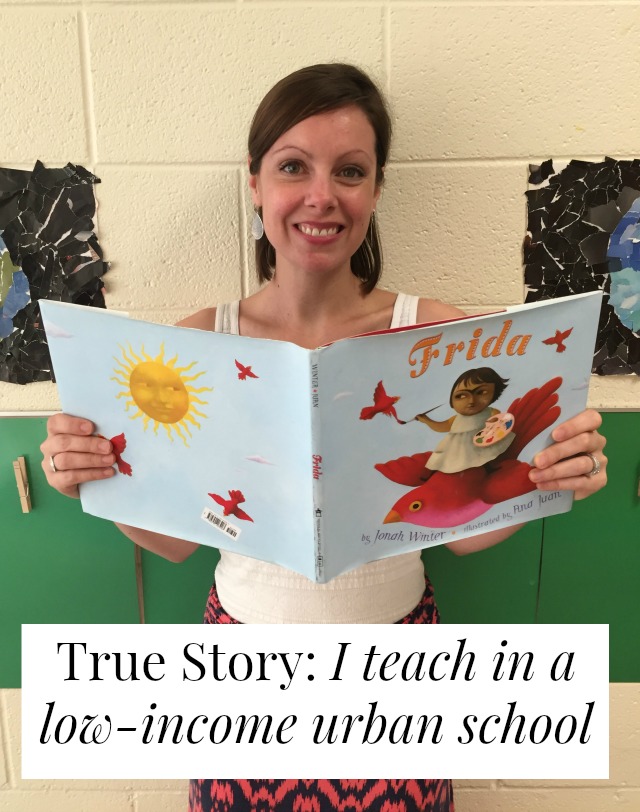
What’s it like to teach in an urban school? Rewarding? Heartbreaking? A little bit of column a and a little bit of column b? Low-income urban school districts are constantly under fire from the government, parents, and community members; teachers leave poor urban schools at a much higher rate than other schools. Today, Charlotte is sharing her experience.
Tell us a bit about yourself!
My name is Charlotte and I’m a long-ago mid-western transplant, though I now claim the south. I’m 34 and have been teaching in public schools for five years, but teaching overall closer to nine years. I’ve mostly taught English as a Second Language (ESL), though I did teach Spanish while getting my MA in Spanish Literature. My most favorite thing to do is travel, followed closely by hiking with my husband and pup.
What made you want to be a teacher?
I never wanted to be a teacher! I always wanted to be paid to travel, no matter what that meant. After college I was volunteering with AmeriCorps in southern Colorado, and I took on teaching ESL in the evenings to recent immigrants in addition to working in the food bank and homeless shelter. (I did this, very selfishly, to practice my Spanish.)
The first night in class a man stood up and told his story about why he came to the US and the pride he felt in working hard to send money to his family. It would be the first of many immigration stories that I would hear, and it hit me. Hard. Following that year I moved to Ecuador to teach English as a Foreign Language (EFL) and realized that I was just hooked.
Your school is a ‘title one’ school. What does that mean?
Title I means that a certain (high) percentage of our students qualify for free or reduced lunch. Using that equation, the government doles out certain amounts of money to Title I schools to be used at their discretion, ostensibly to improve student outcomes.
Off the record, it means that we have a fair amount of students who are living without the basic necessities they need to get through a day, including emotional support at home. Title I schools have to work extra hard to fill in the gaps, but when we are able to, the students soar.
How did you come to teach at your particular school?
I started my public school teaching career in a Title I high school. In our district, which is one of the largest in the nation, the high school in which I taught was tied with another Title I school for highest drop-out rate. I was a lateral entry teacher, which means that I did not get my undergraduate degree in education. I had to take night classes in education while teaching for my first three years. Lateral Entry teachers (in my district, at least) are not permitted to teach in elementary schools.
I made the change to elementary after a particularly difficult day- I had been pushed into a corner by two young men who were fighting, and then locked in a small room with them. It shook me to the realization that I belonged with the younger students, and I really do. It’s a much better fit for my personality.
I think when most people imagine an urban high school, they picture something like ‘Dangerous Minds.’ How far off is that? What are the biggest misconceptions about low-income urban schools?
I can’t stop picturing the perfectly coiffed blonde actress turning the chair around in the music video! The more apt movie comparison is “
Freedom Writers.” What that movie showed fairly well was that the kids have issues that are completely beyond their control, and yet they will still show you their soft side if given the chance. My ESL students in the high school setting were tough kids. But they also were raised in refugee camps in Nepal, or saw people die in the desert on their way into the country, or lived through the terrors of Darfur. Thank god they were tough, right? You have to be to get through those things.
The biggest misconceptions about these types of schools, I think, is that the students just don’t care, or that their families just don’t care. My students, the parents of my students? They care so much they were willing to make giant sacrifices just to be there. And that is true for the non-ESL population too. We are all in it together to make the best of what we’ve got, I think.
Do you have friends who teach in higher income school districts? How does your teaching experience compare to theirs?
I do have friends that teach in private schools in our area, and in higher income districts in other parts of the country. The most common comparison that teachers make is that in high-income schools the issues are different: you have parents who are (ahem) overly involved. Every job has its pros and cons.
I will say that a friend of mine is leaving my current school for a non-Title I school for the next school year. I was talking to her about it and she put it pretty perfectly. She said, “I want to know what it is like to have students that come to school to learn, not for love.” Her point is huge: emotional deficits in students are the determining factor in educating a child. No one I work with is going to power through a lesson if a kid is going through something. That would be useless, and the children come first, always.
What does an average work day look like for you?
I live about 45 minutes from my school, so I’m up at 5:30 AM and out the door an hour later. We have to be at school at 7:15 AM, and because I’m not a general education teacher (in elementary, ESL teachers go into classrooms to assist students. We do not have our own classes.) I have a morning duty of opening cars for children as they come inside and an afternoon duty of getting them safely to their parents waiting outside.
At my school, ESL teachers make their own schedules according to where our students are at any given time. I work with kindergarten, first, and second grades so I’m in those classrooms all day. My school, like many Title I schools, is highly transient, so we have new students coming throughout the year.
If they are new to the country, I have to test them for language proficiency within the first ten days. In fact, about 20% of my year is taken up by testing. That works out to 8 months of teaching out of a 10 month school year.
What are the most challenging aspects of your job?
The all time most challenging aspect of teaching in a Title I school is knowing when you can’t help. People might read that and think, “You should never give up on a child!” When I started teaching, I thought the same. It is a hard pill to swallow, but here’s the issue: you cannot go into people’s homes.
You can’t go home with your students and make sure they have a meal and clean clothes and a bed to sleep in. Don’t get me wrong- if we find out a child has needs at home we do our best to meet them. But we cannot be everything to them, even if they need us to be. And that is really, really difficult to handle some days.
The most rewarding?
The students! It is the absolute best to see these kids every day. And with ESL students, they can come in the beginning of the year not knowing a word of English, and leave conversationally fluent at the end of the year. It is fascinating, and awe-inspiring. It never gets old.
My school is lucky enough to have a lot of quality, veteran teachers and faculty turnover is fairly low comparatively. I was planning on staying at my school long-term, but I received an email a month or so ago from the Human Resources department that let me know I’d been moved to half-time at my school and half-time at a non-Title I school. I’m embracing the change, but my heart hurts a bit to leave my students.
Do you anticipate staying in education long term?
I do anticipate staying in education. My heart leans toward writing but I sincerely believe I’m in the profession that calls me the most. If someone is dying to offer me a travel writing job though, I certainly won’t turn them down!
What can we – the general public who don’t have kids enrolled – do to help struggling public schools?
Vote! And not just for the big stuff. The local government has so much say over what happens in our schools. Please know and understand who you are voting for, and where they stand on education. And also, you may have kids that have other choices in where they go to school, for whatever reason. But please also think about the families that don’t. And vote. Vote!
What have you learned from your work that any of us could apply to our daily lives?
Read to your children. Let them read to you. And if you don’t have children yourself, you probably know one or two. (They are everywhere.) Read to them.








Yes, please read read read! Support your local library too, especially in asking them to have reading programs for kids.
I am a teacher now and have a toddler, so I see a lot of kids of all ages. We can definitely tell which kids are not read to. Start reading early; read as soon as the kid comes home from the hospital. You might think they’re not learning, but kids are little sponges, and they will soak it up. We read anywhere from 3-12 books a night to our little one, and her vocabulary is already huge at 23 months. Reading (and talking to kids about everything, including what you read) is essential to development.
What an interesting interview!
As to reading with children… what if they don’t want to? My nephew is 4, and has no interest. I think he knows most of the alphabet now, but is not into books. My little brother was the same as a youngster, and ultimately it turned out that he had ADHD. Both of them, smart kids, but I think reading is too much focus and sitting still for them to handle? I have not had much luck with getting them to read with me (even if I pick short books that match their interests)… and I love to read. So if you have tips, please share.
Agreed!
We have an 18 month old, and she has NO patience for being read to. 9/10 she rips the books it of our hands and stomps off to the corner with it to read it by herself.
When her paediatrician heard that we read her one book a day or less (realistically), you’d think that we’d admitted to child abuse!
Both my husband and I are big readers and have been since we were tiny, so we’re stumped.
relax! Your child/nephew lives in a household with lots of books and parents who care – they will make their way in the world. Their only problem might be that they’re more apt for becoming a rocket engineer/gardener/opera singer and feel like a constant disgrace to their parents because they didn’t learn reading at four. Sing with them, recite poems, tell them fairy tales, play games, do a puppet show, that’s language actiities as well and don’t include books. They are children, not copies of you and they do not come from a disadvantaged background. I didn’t really read until I was eight, but loved adventure stories on tapes. But the local had more books than tapes and so I started reading and went from 0 books to 10 a week and read way beyond my age group. I had a similar experience with learning English, first I hated it and then I started reading Harry Potter. And apparently I always excelled in math in kindergarten but totally lost an interest afterwards. Children all develop differently, relax.
Have you tried books on tape? I teach grade 3/4 and there are several students who don’t have the patience/skill/stamina to sit and read for more than a couple of minutes. So I let them listen to reading on the computer, where they just have to look at the pictures while someone else reads the words.
Another suggestion is to perhaps try just telling stories without the physical book, or choosing books that are related to their particular interest (tv shows or movie adaptions are always popular in my classroom). Either way, I wouldn’t be too worried yet! 🙂
Thanks for the ideas!
I taught students from low-income backgrounds for 8 years, starting with Teach For America in Los Angeles. Great interview!
I’d add that another great way to support education is to support the teachers who are in the trenches every day! DonorsChoose.org is a great place to start, or just chatting with some local teachers and asking what their immediate needs are. The smallest of donations for you – like a rug or a bookshelf or some extra office supplies – can make a huge difference in the day-to-day functioning of a classroom.
I really enjoyed this interview, and even though I live on the other side of the world (Australia) I can definitely relate to a lot of it! I work in a low socio-economic school and it can be very tough going home at night, especially when you can’t stop thinking about your students who are going through a rough time. I’ve had many a nights crying to my partner because I’ve felt so helpless!
I will definitely agree that teaching is such a rewarding career though – I also never wanted to be a teacher growing up, but after going back to uni to study it at 25, I can’t imagine doing anything else. It’s so exciting to see kids have their ‘aha!’ moments when they finally understand something they have been struggling with, and knowing that you are making a difference in their lives is very humbling.
Never underestimate the power of simply showing an interest in your child’s abilities – if students believe that they can do something, half the battle is already won.
Thanks for running this interview! I am currently working in a Title I school but am leaving at the end of this year. It’s heartbreaking because I love my students, but our district’s teachers have been on a pay freeze since 2012, with no end in sight. It’s so important for the public to understand that my students deserve so much more than our society is giving them.